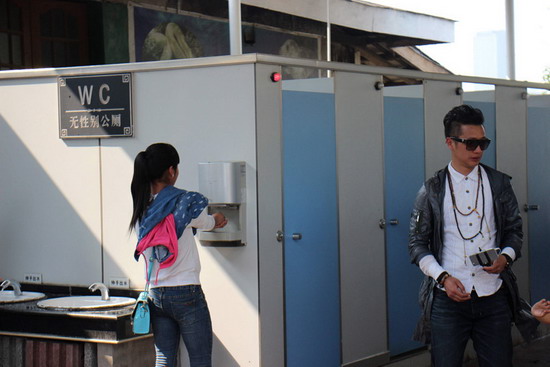 |
|
A unisex public washroom is seen in Chongqing on April 15, 2015. [Photo: CFP] |
Hopping onto the bandwagon of the national development strategy Internet Plus, the nation's capital Beijing is planning to build its own "public toilet plus".
The Beijing Environment Sanitation Engineering Group rolled out an ambitious plan recently to smarten up the capital's 14,000 public toilets under its operations.
According to a preliminary plan, a series of extra services, such as free Wi-Fi, automatic teller machines and charging facilities for cellphones, could be available in the city's public toilets in the near future.
Medical apparatuses that can check a person's blood pressure, heart rate and urine will also be installed for the public's convenience.
In the city's rural areas, public toilets will be converted into entertainment centers that also incorporate libraries, activity rooms and exercise equipment, according to the plan.
Rather than being places where you simply answer nature's call, the government obviously plans to turn public toilets into small service stations.
If the plan becomes reality, there is little doubt that the city's public toilets will have a new lease on life.
However, is it not farcical to see a place where people come and go so quickly transformed into miniature health or leisure centers?
Just imagine a long queue of people anxiously waiting outside, while those inside the toilet cubicles are leisurely playing with their smartphones, taking advantage of the free Wi-Fi access.
For young people who now seem unable to survive without their smartphones, a toilet cubicle may replace a café as a place to while away an afternoon or evening.
Instead of bringing more convenience, free Wi-Fi will only create greater inconvenience.
As to the medical devices, it is hardly a good idea to do a check-up at toilets. It is also weird to read books at toilets no matter how spotless they are.
The extra services, however useful, should not diminish the primary role of toilets.
The authority did stress that these upgrades will not reduce the space for the "toilet part", and will be achieved through a "better optimization" of the inner space.
But it is inevitable that the space for their proper function will be reduced and the plan entails a huge cost in terms of new equipment and maintenance.
As the saying goes, the devil lies in the details. Revamping the public toilets in this way will surely improve the image of Beijing as an international metropolis.
But for a mega-city with a population of more than 20 million, the real issue is having more public toilets that are more evenly and logically distributed.
The unpleasant odors and dirty conditions of many public toilets still make people believe the best and clean toilets are in hotels.
And long queues outside the Ladies at most tourism spots and parks are solid proof that more toilets for women are needed. Even in a number of neighborhoods and shopping malls, it is often embarrassingly hard to find a toilet.
The problem of the lack of public toilets is even more serious in the suburbs and rural areas where the number of shops and restaurants is also limited.
Instead of putting hefty investment into adding unnecessary fancy functions, why not use the money to increase the coverage of public toilets and enhance their management to make them cleaner?
Tidy toilets that can be found around the corner, not Wi-Fi or ATMs, are what people most want to see when they are to relieve themselves.
These fancy new functions can wait until most people can find public toilets with ease.
If you can barely stand, it is wiser to wait a bit before you start to run.
The author is an editor with China Daily. [email protected]

I’ve lived in China for quite a considerable time including my graduate school years, travelled and worked in a few cities and still choose my destination taking into consideration the density of smog or PM2.5 particulate matter in the region.